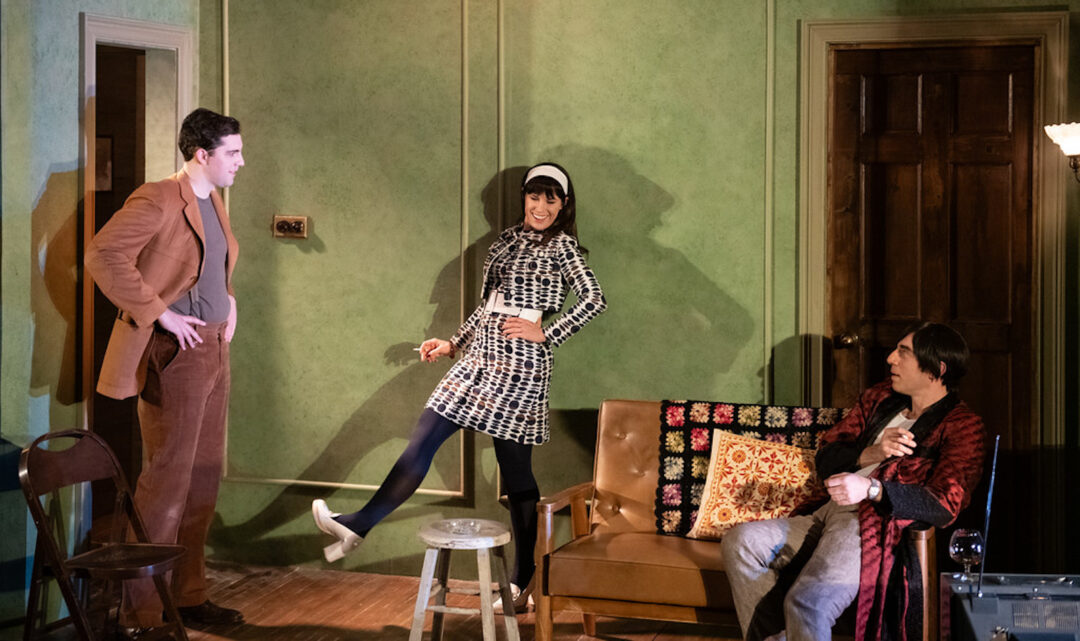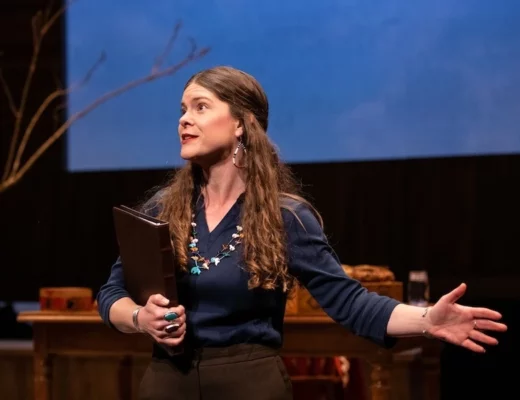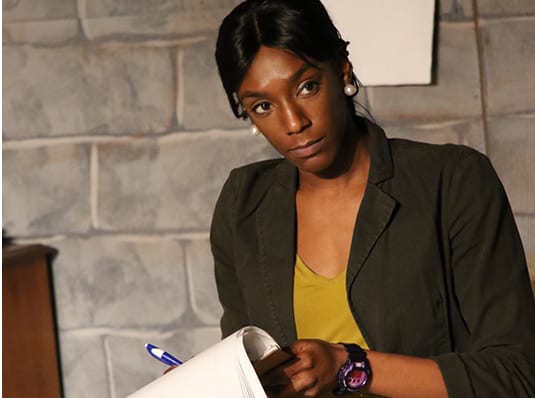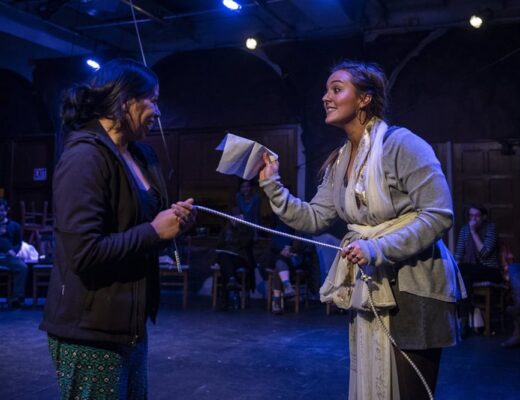By Dillon Lewis
This article was originally published in the The DC Line here.
In an oft-quoted 1780 letter to Abigail Adams, then-Envoy to France John Adams declared, “I must study Politicks and War, that my sons may have liberty to study Mathematicks and Philosophy … in order to give their Children a right to study Painting, Poetry, Musick, Architecture, Statuary, Tapestry and Porcelaine.” Adams’ attitude was emblematic of a new American ethos bent on building a better life for their progeny.
But in Love, Love, Love, playing through March 3 at Studio Theatre, British playwright Mike Bartlett dares to ask what happens when a prosperous generation fails to secure that life for their children, perhaps for the first time in modern history. Nevermind the play’s roots in the U.K. – the hard truths of blissful Boomer ignorance feel right at home on American soil, where those born between 1946 and 1964 possess half of the nation’s wealth. Despite this immense concentration of resources, Bartlett persuasively makes the case that the sorry state of =affairs for younger generations can be chalked up to the hedonistic entitlement of their parents, a corrupted carryover of free love and rebellion of the 1960s.
In a dingy London flat in 1967, long-haired Oxford student Kenneth (Max Gordon Moore) lounges on his brother’s couch, awestruck by a broadcast of Our World, the pioneering live multinational multi-satellite television program that saw the debut of The Beatles’ classic “All You Need Is Love.” Frustrated at his brother’s laziness, billboard installer Henry (Hunter Hoffman) admonishes Kenneth as a “layabout” who garners more cash through a government-funded scholarship than their working-class father earns at his job. Upon her arrival, Henry’s date Sandra (Liza J. Bennett), a 19-year-old Oxford student and second-wave feminist, is instantly taken with Kenneth’s progressive views and lack of concern about the future. After sending Henry out to pick up dinner, she and Kenneth begin an indulgent yearslong love affair that is marked by decadence, destruction and, eventually, divorce.
But Bartlett argues that old habits are hard to break, even among young iconoclasts. Kenneth and Sandra’s radical independence undergoes a two-decade transformation into boredom-driven infidelity and self-centered flippancy during the first of two intermissions. Having moved out of London to suburban Reading, their tastes — and attitudes — have changed with both the times and their economic prosperity. An old record player is replaced by a large stereo; plain walls painted mushy-pea green give way to chic wood paneling with abstract art; and cheap Irish whiskey cut with ginger ale is tossed in favor of French red wine. Most strikingly, bold patterns and casual clothing are swapped for chic business attire and private school uniforms worn by their two teenage children, Jamie (Max Jackson) and Rose (Madeline Seidman). And despite every indication that their kids are deteriorating faster than the likelihood of a Beatles reunion, Sandra assures herself that her broken family is superior to the loud, less affluent family who lives next door — she and Kenneth, after all, yell at each other only inside the house.
After two acts fueled by Kenneth and Sandra’s ruthless narcissism, Bartlett focuses the final act on taking a hammer to the elaborate facade they have erected of a successful family — despite the intervening decades they have spent as exes. Returning home for her Uncle Henry’s funeral, Rose — now approaching her middle years — seizes the opportunity to usher in a comeuppance of her parents, who are enjoying cozy retirements in their spacious homes. She makes a shocking ask: that her affluent parents buy her a home in London, relieving her of the financial struggle that accompanies the music career her parents encouraged her to pursue. Balking at her request, Sandra and Kenneth assert their strong work ethic as the driver of their prosperity, highlighting the advantages they provided to their daughter while ignoring the privileges they themselves enjoyed. Rose admonishes them for their selfishness, blaming them for her face-in-phone brother’s failure to launch and decrying their generation’s tendency toward accumulation. They consider her request and its accompanying criticism only briefly and not very seriously. And in a striking final moment, they ponder what they may instead do with the rest of their lives and their money, blissfully dancing to “All You Need Is Love” in the shadows of accumulated wealth and the frowns of their damaged children.
Directed by Artistic Director David Muse, Love, Love, Love is a bold choice for Studio Theatre. Aside from the obvious indicators of gentrification and a widening wealth gap that can be seen just outside of the theater’s 14th Street doors, regional theaters throughout the United States have long relied on the very age group Bartlett appears to be chiding. As theaters across the U.S. have grappled with identifying a sustainable audience model, ticket prices have continued to rise, putting an evening at the theater further out of economic reach for many would-be theatergoers of Rose’s and Jamie’s generation. But, if the theater is meant to inspire conversations and hold a mirror to its audience, then the selection of Love, Love, Love pays off immensely. Audiences may very well feel the tension in the room shifting, even as the bad behavior of Bartlett’s Boomer proxies becomes more and more outlandish.
It is in that behavior that Bartlett and Muse may sacrifice a portion of their audience. Though Sandra and Kenneth’s entitlement is often deeply funny, the play never fully transcends into the kind of encompassing satire that would allow Kenneth and Sandra to become sufficient stand-ins for their generation. By the end of the first act, Sandra and Kenneth are so singularly unlikable that audiences may not recognize themselves in the characters, let alone be primed for the kind of introspection that Bartlett practically begs for in the third act. Thankfully, the two subsequent acts are likely strong enough to solicit sufficient investment from a majority of the audience.
Without a doubt, Muse has assembled a first-rate cast to deliver the play. Though the accents may be spotty, the driving energy is not. Bennett is especially effective as Sandra, taking to heart the character’s pseudo-self-deprecating comment about her own chattiness. In all of Sandra’s conversational facets, whether they be flirtatious, brash or defensive, Bennett is an unstoppable force — even at Sandra’s most insufferable moments, Bennett is nothing short of engaging. Seidman’s performance is similarly engrossing. Always on the verge of tears, Seidman’s emotional Rose offers an earnestness and understanding of the larger world that neither of her parents is able to achieve. Her plea for assistance is not one of entitlement, as her parents would have you believe. It is of existential dispair.
Muse has also engaged a talented corps of designers. Set designer Alexander Woodward leverages Studio’s Victor Shargai stage to underscore Bartlett’s critique of wealth hoarding. Beginning with an untidy, claustrophobic apartment, the size and chicness of Sandra and Kennth’s home grows in correlation with their affluence, culminating in a massive living room with two doors that open to a terrace. Notably, the ceiling continues to rise, lifting farther out of reach, accordingly. Costume designer Montana Levi Blanco nails the shifting fashion and economic landscapes the characters traverse. Lighting designer Cha See’s subtle but strong work is most effective in the play’s final moments. And sound designer Matthew M. Nielson’s use of period music as touchstones for each of the play’s three acts does well in setting both the time and mood of the onstage action.
That Bartlett chose to make “All You Need Is Love” the play’s functional theme song is a cheeky delight. While it certainly helps American audiences acclimate to the British ambiance, its self-reliant lyrics and assertion about the paramount importance of love more importantly offer an ironic throughline among such abundance. Bartlett asserts that a generation who proclaimed to need one thing has taken everything. In borrowing from the revolutionary spirit that was once a hallmark of those he takes to task, Bartlett is neither polite nor delicate in his critiques. But like finding himself at the bottom of a pyramid scheme, Bartlett asks an existential question on behalf of his generation: What’s left for us? Maybe love isn’t all you need.
One thing is clear: the kids are not OK, Boomer.





No Comments